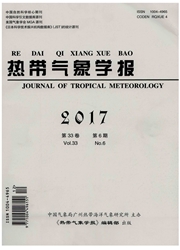

 中文摘要:
中文摘要:
文章的第I部分(兰伟仁等,2010),利用模拟雷达资料在假定模式无误差的情况下进行了一系列的集合卡尔曼滤波(EnKF)敏感性试验,验证了EnKF方法在风暴尺度天气资料同化中的作用。本文继续探讨EnKF在有显著模式误差的情况下同化模拟多普勒雷达资料的效果问题。试验中假定模式误差主要来源于微物理过程参数化的不确定性。结果表明:模式误差在不同程度上影响了EnKF分析的效果,对微物理量的影响尤其明显;在EnKF分析中,利用微物理过程参数化集合的方法来考虑模式误差,对速度场、位温场以及比湿场有较明显的正作用,但对于微物理量场分析效果较差;若包含控制试验的微物理过程参数化方案,则EnKF对所有变量都有正效果,随着同化循环次数的增加,分析结果更加合理;只考虑冰相过程的微物理过程参数化方案的集合,分析效果进一步提高。
 英文摘要:
英文摘要:
In Part I(Lan et al.,2010)of this study the feasibility of using an ensemble Kalman filter(EnKF)for storm-scale data assimilation of simulated Doppler radar data is demonstrated assuming a perfect forecast model for a supercell storm.The current study explores the performance of the EnKF in the presence of significant model errors due to microphysical parameterizations.The truth is generated by model simulation using the Lin ice microphysical parameterization.In the first group of EnKF experiments,only one optional microphysical parameterization is used in each experiment to include the model error.The results show that the EnKF performance is seriously degraded,especially for microphysical variables.Then some multi-scheme EnKF experiments are performed.A multi-scheme ensemble forecast that combines all different microphysical parameterization schemes can significantly improve the EnKF performance.The microphysical variables can also be well retrieved.A more targeted multi-scheme is also tested.In this experiment,the multi-scheme ensemble only includes ice microphysical parameterization schemes and the performance of EnKF is further improved.
 同期刊论文项目
同期刊论文项目
 同项目期刊论文
同项目期刊论文
 期刊信息
期刊信息
